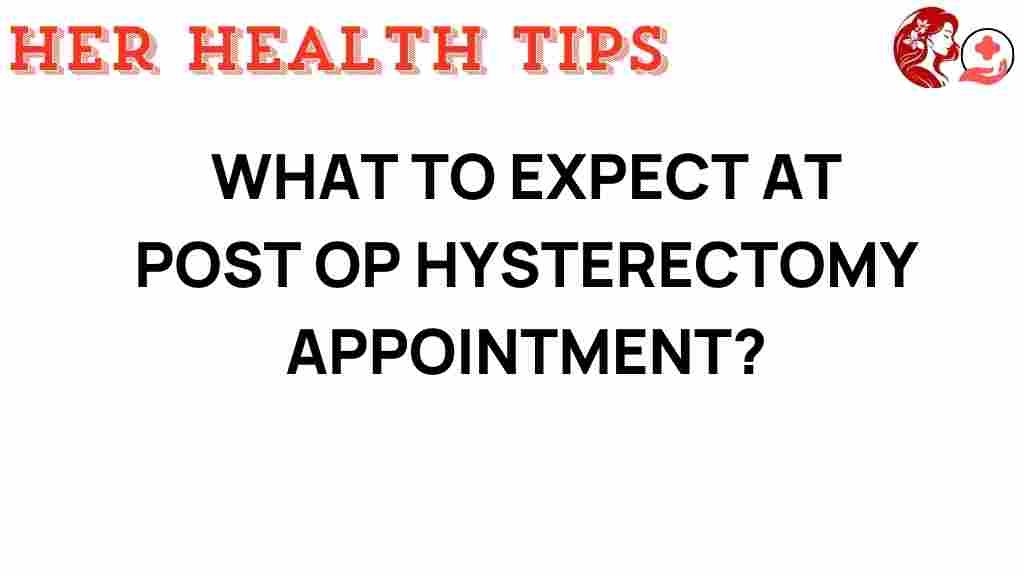What Awaits You at Your Post-Op Hysterectomy Appointment?
After undergoing a hysterectomy, your journey to recovery is just beginning. The post-op appointment is a critical part of your healing process and offers an opportunity to assess your recovery, address any concerns, and ensure that your health is on the right track. In this article, we will explore what to expect during your post-op appointment, the importance of follow-up care in women’s health, and tips for a smoother recovery.
Understanding Hysterectomy and Its Impact
A hysterectomy is a surgical procedure that involves the removal of the uterus. This surgery may be performed for various reasons, including:
- Uterine fibroids
- Endometriosis
- Uterine prolapse
- Abnormal bleeding
- Cancer
Recognizing the psychological and physical impact of this surgery on women’s health is essential. Many women experience a range of emotions post-operatively, which is why understanding the follow-up care process can help ease these feelings.
When to Schedule Your Post-Op Appointment
Typically, your follow-up post-op appointment is scheduled about 6 to 8 weeks after your hysterectomy. Your healthcare provider will give you specific instructions regarding when to come back for your check-up. Regular follow-up is crucial for monitoring your recovery progress.
What to Expect at Your Post-Op Appointment
During your post-op appointment, your healthcare provider will evaluate your healing process and address any concerns you may have. Here’s a step-by-step guide of what to expect:
1. Review of Medical History
Your doctor will start by reviewing your medical history and the details of your gynecological surgery. Be prepared to discuss:
- Your symptoms before the surgery
- The type of hysterectomy performed (abdominal, vaginal, or laparoscopic)
- Any complications you may have experienced during or after the surgery
2. Physical Examination
A physical examination will be performed to check your healing progress. This may include:
- Checking your incision sites for signs of infection or healing
- Assessing your overall physical health
- Monitoring your vital signs
3. Discussion of Symptoms and Concerns
Be open about any symptoms you are experiencing, such as:
- Pain or discomfort
- Bleeding or discharge
- Changes in mood or anxiety levels
Discussing these symptoms candidly will help your doctor provide the best medical advice tailored to your recovery.
4. Follow-Up Tests
In some cases, your doctor may recommend follow-up tests to ensure everything is healing properly. This may include:
- Blood tests to check hormone levels
- Ultrasounds to visualize internal structures
- Other imaging tests if necessary
5. Recovery Guidance
Your healthcare provider will offer guidance on your recovery process, including:
- Activity restrictions (lifting, exercise, and sexual activity)
- Dietary recommendations to promote healing
- Medication management to control pain and prevent infection
Tips for a Successful Recovery
To support your recovery after a hysterectomy, consider the following tips:
- Rest and Relaxation: Give your body the time it needs to heal. Avoid strenuous activities during the initial recovery phase.
- Stay Hydrated: Drink plenty of water to stay hydrated, which aids in recovery.
- Follow Medical Advice: Adhere to your doctor’s recommendations regarding medications and activity levels.
- Monitor Your Symptoms: Keep track of any unusual symptoms and report them to your healthcare provider promptly.
- Seek Support: Don’t hesitate to ask for help from family and friends during your recovery.
Potential Challenges During Recovery
While many women experience a smooth recovery, some may face challenges. Common issues include:
- Pain Management: Some women may experience chronic pain post-surgery. Discuss any pain concerns with your doctor.
- Emotional Changes: Hormonal changes after a hysterectomy can lead to mood swings or depression. Consider speaking to a mental health professional if needed.
- Changes in Sexual Function: Women may experience changes in libido or discomfort during intercourse. Open communication with your partner and healthcare provider is essential.
Frequently Asked Questions
What can I do to manage pain after my hysterectomy?
Follow your doctor’s instructions regarding pain management. Over-the-counter pain relievers may help, but prescription medications might be necessary for some women. Always consult your healthcare provider before taking any medications.
When can I return to work after a hysterectomy?
The timeline for returning to work varies depending on the type of surgery and your individual recovery. Generally, women can return to work within 4 to 6 weeks, but it’s best to discuss your situation with your doctor.
Will I experience hormonal changes after a hysterectomy?
If your ovaries are removed during the procedure, you may experience symptoms of menopause, such as hot flashes and mood swings. Speak with your healthcare provider about managing these symptoms.
Conclusion
Your post-op appointment following a hysterectomy is a vital step in your recovery journey. It provides an opportunity to address any concerns, receive guidance on your recovery, and ensure that your health remains a priority. Remember that open communication with your healthcare provider is essential for a successful recovery and for navigating any challenges that may arise.
For more information on women’s health and recovery after gynecological surgery, consider visiting the Office on Women’s Health. And don’t hesitate to reach out to your healthcare provider to schedule your follow-up care.
Taking charge of your recovery process is key to ensuring that you feel your best both physically and emotionally after your hysterectomy. Your health matters, and the right support can make all the difference.
This article is in the category Reproductive and created by HerHealthTips Team
